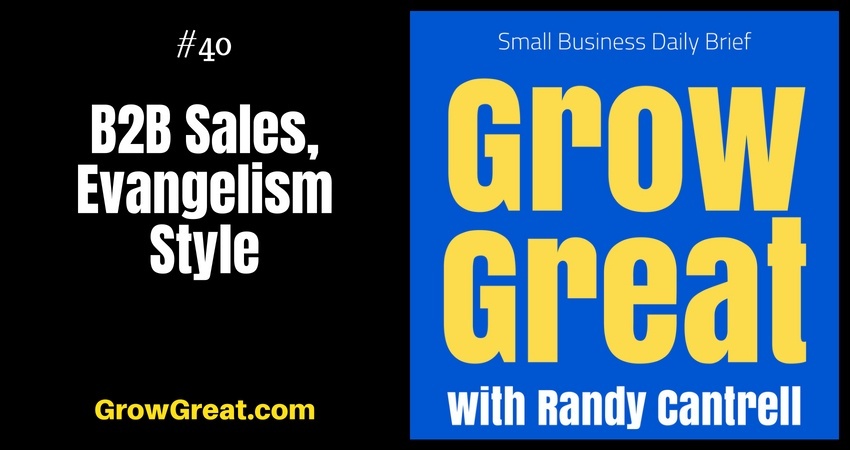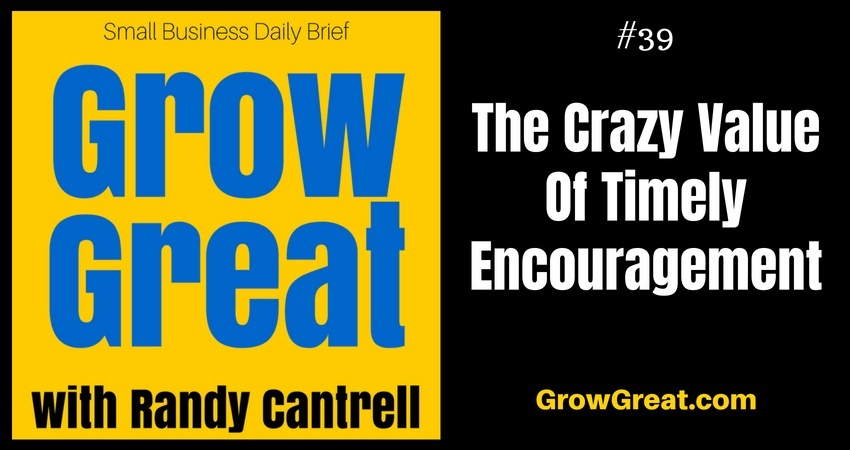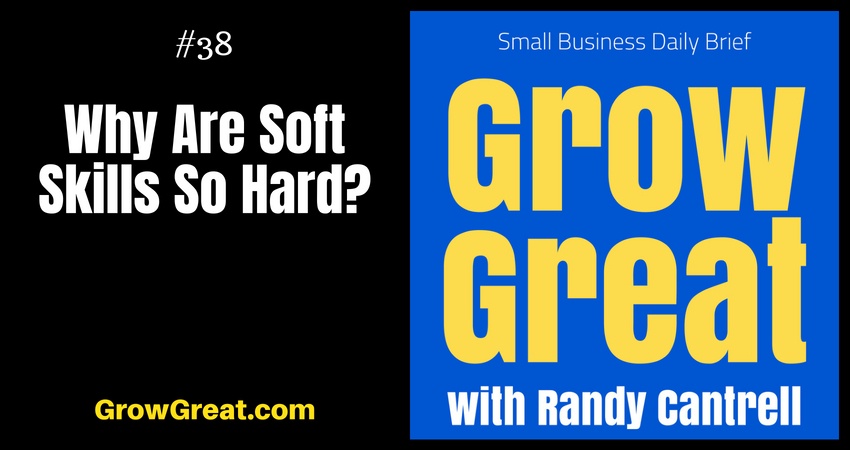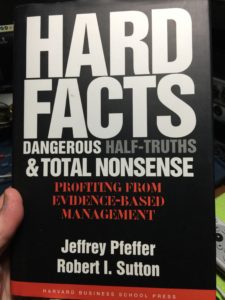B2B Sales, Evangelism Style – Grow Great Small Business Daily Brief #40 – July 18, 2018
Podcast: Play in new window | Download (Duration: 11:18 — 11.5MB)
Subscribe: Apple Podcasts | Spotify | RSS | More

B2B isn’t necessarily so different from B2C, but today let’s talk about selling in the business-to-business space. One major distinction between B2C and B2B is the sales cycle and the need for relationship building. B2B is usually far less transactional than B2C. It takes longer to close the deal. There may be many more influencers involved in the decision. It’s usually more relationship-oriented, to boot.
B2B sales cycles can be extremely long, requiring patience and lots of follow-ups (and follow-through). There are tons of sales experts you can follow. Many of them are quite good. I especially enjoy the work of Jeffrey Gitomer, whose work I’ve followed for the last 30 plus years. Did I tell you about the time I ran into him at the Sky-Harbor Airport in Phoenix? I was about to board a plane as he was just arriving. I approached him telling him how much I had enjoyed his work. And I told him (truth) that his book, “Customer Satisfaction is Worthless, Customer Loyalty is Priceless,” was easily the book I gifted most. That’s still true, too. I have no idea how many copies of that book I’ve purchased and given away! We swapped business cards and were on our separate ways. Two days later a FedEx package arrived to my office. It was an autographed copy of Jeffrey’s most recent book at the time. The man is prolific, but he long ago told the world the secret to his ability to crank out books. While the rest of the world is becoming an expert at whatever popular TV show may be airing…he’s writing. But the point is that Jeffrey, while in Arizona had his office send me a copy of his most recent book via FedEx. He’s a man who isn’t driven by transactions, even though buying a book is very transactional. It’s why I love him and his work.
I hate transactional selling. I used to hate it because I wasn’t suited for it, but through the years I’ve learned to hate it because it reeks of selfishness.
Old school sales guys taught me early all the well-known (and some not so well-known) tactics of the day. I grew up in retail, taught by merchants. Real merchants. Operators. But old-school guys leveraged something over all the tactics and strategies. Standing on their word. Past all the embellishment, exaggeration and other sales tactics was a real where-the-rubber-meets-the-road honesty. If they stood toe to toe with you and shook your hand, you could trust it. As a teenager, it was puzzling to me because it didn’t quite fit. One minute they’re telling a prospect things that weren’t quite accurate, but at the end of the deal, they were also shaking the customer’s hand telling them how they’d stand behind it. And they would. It’s like there were two stages of the sales process for them. First, say what you need to do get them to buy. Second, guarantee you’ll take care of them. And mean it.
I quickly adapted to altering the first tactic to fit my personal beliefs. I’d ask questions to figure out what they needed to know in order to buy. Looking for hot buttons. Points of interest. Features they wanted and were willing to pay for. The word that always trumped it all for me was congruency. I wanted the customer to buy what best fit their needs and desires. It didn’t matter what I wanted. That made that second tactic super easy – standing behind it. Within a year of selling I had figured out so many things, chief among them – a sales isn’t a sale if it doesn’t stick. I didn’t want any returns. Or complaints.
Today, nothing has changed. Apply those tactics in the B2B spaces and I’m prone to always (that’s right, always) add another component. Evangelism.
Many years ago I studied call reluctance. Largely because I suffered it. I’ve even done some call reluctance coaching, but I’m not your man if you’re looking for specific sales coaching (even though I’ve done it for more than 30 years). Call reluctance is a booger bear made even more difficult when people don’t really like or believe in what they’re selling. My solution for call reluctance in such cases is to quit. Find something you love and believe in.
This is where evangelism makes the difference. And where today’s culture is so much better than when my career started. Sharing stories is the way the world works today! It’s attractive. And gets attention. Largely because there are so many services and products today that didn’t exist 18 months ago. As we chase the technology we have to be open to learning more and more about new things. Things we had no prior knowledge of.
But I don’t care if you’re selling something unsexy and traditional, or something bleeding edge. Every product and service is benefited by an evangelist thrilled to find out how their thing can change your life.
Evangelism starts with questions. Where is the prospect right now? What problems do they have? What solutions are they desperate to find? What do they like? What do they hate? It’s not an interrogation, but it’s a conversation with an aim. A purpose. To put the prospect at the forefront of everything. It’s not about you. It’s about them.
Questions make that clear.
Think of the stereotypical blind date where the guy is sitting across the table talking about himself. And more about himself. He’s not asking the girl a single question. How do you suppose that’s working out for him? You know. It’s not.
Take the same couple and flip things. The guy is asking questions to find out more about her. He’s listening. Responding to her answers. His interest and curiosity in her is apparent. It’s a completely different experience for both of them. Better in every way.
You think it doesn’t roll that way with your prospects? It does. And I’ll go you one better. It separates you from the hucksters who live by the idiotic mantra, “Always Be Closing.” You may as well adopt the philosophy, “Always Be Chasing Your Prospects Away.”
Evangelism is driven by a few key things.
One, belief. Belief in the service or product. An intense belief that the thing can dramatically help the customer. Maybe it’s life-changing in a small way. Maybe in a big way. The Peer Advantage by Bula Network is a new endeavor I’m pursuing. I’m working to build two online, virtual peer groups of small business owners from around the United States. 14 people are going to experience life-changing benefits. I have a very strong belief in it. I know it will be perhaps the most important investment these business owners will make in themselves and their ability to take their companies to whole new levels of accomplishment. Why do it, if I don’t believe it that strongly? Ditto for whatever you’re selling.
Two, value. My belief is driven by the same thing that drives all belief. If there’s no value, then how can you believe in it? Sure, you can believe in the compensation you’ll get for talking somebody into something, but that’s not true value. I’m not focused on the return or revenue I can get from launching The Peer Advantage by Bula Network. It’s important, but only in the sense that I need to be able to serve and keep on serving. That means I need proper resources to deliver the value. You need it, too. First you need to provide extraordinary value to your customers.
Three, curiosity (interest in the prospect). Without curiosity to learn and understand the prospect, sales evangelism-style, can’t happen. This is closely aligned with point two of value. Both are focused on the prospect (and eventually, the customer). They’re just the opposite of traditional transactional selling.
Questions are the tool. They display interest. Genuine interest. And they help you understand. Not with preconceived answers, but with honest understanding.
Four, education. It’s show ‘n tell. Once we have a more clear understanding of our prospect we can then extend the courtesy to share with them our answers and solutions to their problems. Not with an effort to close the deal, but with an effort to supply prospects with sufficient information so they can better decide for themselves. When we properly teach our prospects, we can serve them well even if they don’t buy from us. Education empowers prospects to do what I constanly urge you to do, figure it out for themselves. The alternative is to manipulate. Manipulation is where I win, you lose. Evangelism is where we both win.
Fifth, blatant honesty. I employ the adjective “blatant” because it works. Granted, it comes easily to me. I can get to that third element – curiosity – and within a few questions answered feel like I’m not the right guy for the task. I don’t hesitate to tell some prospects that. In bold terms. It’s not a tactic. It’s just the truth. But part of my blatant honesty flows into the last element.
Sixth, respect the prospect. They can decide for themselves. You’re putting entirely too much pressure on yourself to assume the sale will happen if you control things…and you’ll lose it if you don’t. Surrender the power of choice to the prospect. When you really feel respect for the prospect they’ll feel it. They won’t feel pressured. They’ll relax and be better able to decide what’s best for them, as they see it. You can disagree with them all you want (quietly or openly) and it doesn’t matter. It’s their life. They want what they want. They need what they need. Respect them enough to accept their decision, whatever it may be.
Be well. Do good. Grow great!

Listen to the podcast
B2B Sales, Evangelism Style – Grow Great Small Business Daily Brief #40 – July 18, 2018 Read More »





 Some years ago (March 2006) a couple of my favorite business authors – Jeffrey Pfeffer and Robert Sutton – wrote a book entitled, “HARD FACTS, DANGEROUS HALF-TRUTHS AND TOTAL NONSENSE: Profiting from Evidence-Based Management.” Most of us claim to be fond of evidence-based management and leadership. And we claim to practice it. But do we really?
Some years ago (March 2006) a couple of my favorite business authors – Jeffrey Pfeffer and Robert Sutton – wrote a book entitled, “HARD FACTS, DANGEROUS HALF-TRUTHS AND TOTAL NONSENSE: Profiting from Evidence-Based Management.” Most of us claim to be fond of evidence-based management and leadership. And we claim to practice it. But do we really? 

